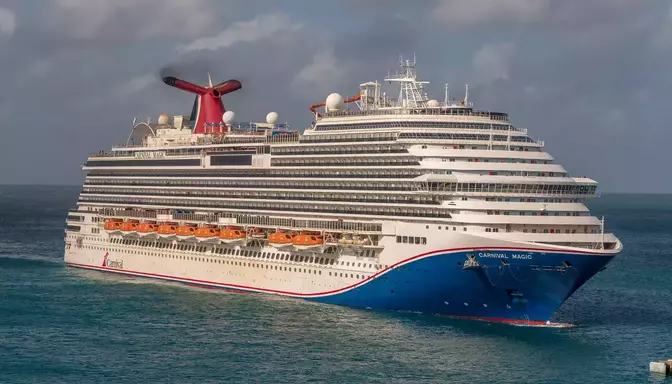Diksia.com - NORFOLK, Va. – Alonzo and Hazel Bristol found themselves in a distressing situation during a May evening aboard the Carnival Magic cruise ship. After dinner, while walking back to their room with a family friend, Alonzo suddenly complained of dizziness and collapsed in the hallway.
Tragically, he was experiencing a heart attack and passed away shortly afterward, as the vessel voyaged from the Bahamas back to Norfolk.
In the aftermath of the incident, Alonzo’s family has been left with a mixture of grief and frustration, primarily directed towards Carnival Cruise Line.
They believe that the ship’s staff responded too slowly during the emergency and have been grappling with the legal complexities surrounding the “death on the high seas” law, a century-old regulation in the United States.
Alonzo, an 88-year-old retired Air Force veteran from Hampton, had a deep affection for cruises. The couple had been on numerous voyages, and they held prestigious membership as platinum members of Carnival’s Very Important Fun Person Club, a category just below the highest tier.
According to Hazel, when her husband collapsed on May 19, the staff present seemed ill-prepared. Custodial workers recognized the gravity of the medical situation in the hallway before higher-ranking crew members, including a guest relations manager, arrived on the scene.
Despite Alonzo lying face-down on the floor, the staff struggled to operate their communication devices to call for medical assistance.
Hazel alleges that, during this critical time, no one performed lifesaving measures on Alonzo. It was eventually a fellow guest who managed to reach the ship’s medical personnel using the phone in their room.
The ship was approximately 12 hours away from Norfolk when this tragic event occurred, as reported by the Bristols.
In response to the incident, Carnival cruises returned to Norfolk in May 2022, marking their first arrival since 2019 when the pandemic halted the industry.
Moreover, in December, the company finalized a deal to offer its inaugural year-round sailings from Norfolk, scheduled for 2025.
Carnival Cruise Line’s spokesperson refrained from commenting on the specific incident but stated that their shipboard staff adhered to the company’s emergency protocols, which included administering CPR and using an AED (automated external defibrillator) on Alonzo. The spokesperson expressed condolences to the Bristol family and conveyed sympathy during this difficult time.
The cruise line’s website highlights that all officers and crew undergo rigorous safety and emergency training that surpasses regulatory requirements. They also receive specialized training to handle emergency situations and assist guests accordingly.
Additionally, Carnival’s Passenger Bill of Rights ensures that professional emergency medical attention is readily available on board until shore-side medical care becomes accessible, along with a properly trained ship crew in emergency and evacuation procedures.
Hazel estimates that her husband lay on the floor, experiencing what the Office of the Chief Medical Examiner later determined to be an acute coronary insufficiency (a heart attack), for at least 15 minutes before receiving treatment, despite several staff members being present.
His demise that night was attributed to natural causes, and it was known that he was a diabetic. Carnival offered their condolences and provided a refund for the family’s trip.
Alonzo Bristol III, also residing in Hampton, expressed frustration, stating that prompt medical attention might not have guaranteed his father’s survival, but the malfunctioning equipment denied him even a chance. Carnival sent Hazel a voucher for a free cruise, but Alonzo III viewed it as an insensitive gesture.
Despite considering legal action, the family faced obstacles as most attorneys cited the federal Death on the High Seas Act. This century-old admiralty law restricts the recovery of certain damages for deaths occurring beyond 3 nautical miles from the United States shores.
In addition to federal law, passengers encounter barriers to suing cruise lines through the ticket contract they must agree to. The contract acknowledges that medical care may be limited or delayed, especially during segments of the voyage where medical care and evacuation options might be scarce.
It also declares that the passenger’s own health insurance would not apply to medical services received on board, making such charges ineligible for reimbursement from their insurance.
The ticket contract strongly recommends passengers to purchase travel insurance to offset potential medical costs. The Bristols had followed this recommendation and procured travel insurance before embarking.
Tom Scolaro, an attorney from Miami-based law firm Leesfield Scolaro, who has handled several medical lawsuits against cruise lines, shed light on the inadequacy of medical care on cruises.
He mentioned that the physicians on board are often not educated and trained in the US and lack board certification in their fields.
The resources available on cruise ships are limited, and passengers are at the mercy of the ship’s decision regarding medical evacuation to a shore-side hospital.
Scolaro highlighted the challenge faced in determining what medical measures cruise staff are equipped to perform on board and when immediate ship evacuation for treatment at a shore-side hospital becomes necessary, a pivotal factor in these cases.
Source: https://www.spokesman.com/stories/2023/jul/30/heart-attack-aboard-carnival-cruise-raises-questio/






